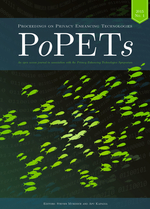„On Defeating Graph Analysis of Anonymous Transactions“ Accepted to PETS 2022
The paper „On Defeating Graph Analysis of Anonymous Transactions“ has been accepted to 22nd Privacy Enhancing Technologies Symposium. This is a joint work of Christoph Egger, Russell W. F. Lai, Viktoria Ronge, Ivy K. Y. Woo, and Hoover H. F. Yin.
In a ring-signature-based anonymous cryptocurrency, signers of a transaction are hidden among a set of potential signers, called a ring, whose size is much smaller than the number of all users. The ring-membership relations specified by the sets of transactions thus induce bipartite transaction graphs, whose distribution is in turn induced by the ring sampler underlying the cryptocurrency.
Since efficient graph analysis could be performed on transaction graphs to potentially deanonymise signers, it is crucial to understand the resistance of (the transaction graphs induced by) a ring sampler against graph analysis. Of particular interest is the class of partitioning ring samplers. Although previous works showed that they provide almost optimal local anonymity, their resistance against global, e.g. graph-based, attacks were unclear.
In this work, we analyse transaction graphs induced by partitioning ring samplers. Specifically, we show (partly analytically and partly empirically) that, somewhat surprisingly, by setting the ring size to be at least logarithmic in the number of users, a graph-analysing adversary is no better than the one that performs random guessing in deanonymisation up to constant factor of 2.
